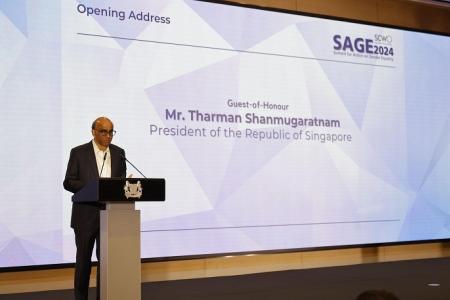Gender equality is about recognising women’s abilities
Helping women to achieve their full potential at work is not a matter of setting quotas to ensure workplace representation, but of avoiding blinkers and recognising the full range of their abilities, said President Tharman Shanmugaratnam.
Speaking at the Singapore Council of Women’s Organisations (SCWO) Summit for Action on Gender Equality on Sept 5, he called on employers to be more family-friendly with flexible work arrangements and to increase women’s representation at senior management levels.
Held at One Farrer Hotel, the first such summit by SCWO – the national coordinating body of women’s organisations in Singapore – was launched in 2024 to lead conversations on how to tackle systemic and personal issues relating to gender equality.
Mr Tharman noted that Singapore fares well internationally on measures of gender equality. It ranked eighth in the latest UN Human Development Report’s Gender Inequality Index, and was the only Asia-Pacific country to make it to the list of top 10 least unequal countries.
Singapore’s adjusted gender pay gap of about 6 per cent – a measure of gaps between women’s and men’s pay after taking into account differences in job roles – is also lower than in the US and Canada, he said.
Mr Tharman said the “glass” of gender equality is “close to full” when it comes to legal rights and protections for girls and women, and “more than half full” with regard to economic empowerment, but appears “less than half full” when it comes to the imbalances in men and women’s domestic responsibilities.
He added: “We must make the workplace more family-friendly and make further gains in women’s representation at senior management levels.”
But he stressed the wisdom of sticking to a system where people advance on the basis of their merits and what they can contribute. “It is the best way for women themselves, so that they advance without feeling that they got there merely by having ticked a box on diversity. And it is the best way to avoid breeding resentment among men.”
What employers can and should do is pay attention to the full range of abilities women may bring, and avoid measuring them on “only the metrics of achievement that men may be most comfortable with”.
He added that employers can expose female workers to fields outside of those conventional for women in the past – such as advanced manufacturing, technology or quantitative finance – as well as to postings overseas.
“All this is a matter of craft in corporate leadership, not the setting of quotas for women or any other under-represented group.”
“It is the right thing to enable every individual to contribute their most, and not hold them back with glass ceilings or broken rungs in the ladder on the way up,” he added.
About 400 people attended the event, which saw experts discussing obstacles to gender equality in Singapore and Asia in areas such as ageing, caregiving and the gender pay gap.
Ms Alicia Yi, vice-chairwoman of management consulting firm Korn Ferry’s global consumer market, said at a panel discussion on the gender pay gap that companies may not set out to pay women less, but “it is happening because it is unconscious; it is happening because it is cultural, and it is happening because women are also not fighting for their worth”.
She cited companies in Europe and the US which disclose pay ranges in their job postings, and others which do not require applicants to share their last-drawn salaries in order not to perpetuate low pay.
The topic of women’s responsibilities in the household was brought up by Singapore’s former president Halimah Yacob, who gave the closing address at the event. Entrenched societal attitudes, such as the expectation that working women should still perform most household and care duties, can limit and disadvantage women, she said.
“Caregiving has become so feminised that women remain responsible for resolving care needs, even when they are working, which impedes their progress at work.”
She also stressed the need to respect women’s choices, whether this is to be a housewife or to pursue a career.
Recalling how she cared for both her children and her elderly mother in the last years of her mother’s life, Madam Halimah said: “Often, working women with children or who have responsibility for the care of elderly persons have the unbearable guilt that they are not doing enough as a parent or as a daughter, and those who are homemakers feel that they are less worthy because their work is not recognised as a productive economic activity.
“So, women end up feeling undervalued and unappreciated.”
On the topic of recognising caregiving work by paying for it, executive director of the Association of Women for Action and Research Corinna Lim said caregivers need not be paid directly, for a start.
For instance, paid leave can be given to take care of the elderly, on top of existing parental leave provisions. Citing an average utilisation rate of four days, she suggested that the remaining 10 days of medical leave can be used for an employee’s dependents.
Ms Lim also suggested topping up the Central Provident Fund accounts of caregivers when they age to help them prepare for their own retirement.
Madam Halimah said of caregiving needs: “These are not women’s issues. These are issues that affect all in our society, and we will be able to find lasting solutions when there has been a mindset shift and attitudes have changed.”
Get The New Paper on your phone with the free TNP app. Download from the Apple App Store or Google Play Store now


